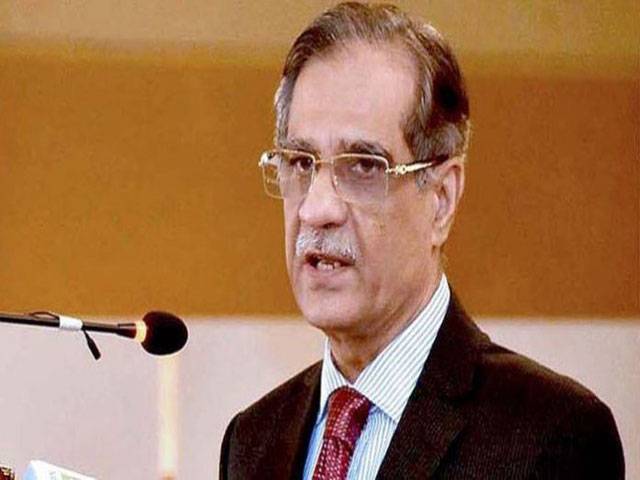ISLAMABAD - Chief Justice of Pakistan Mian Saqib Nisar has observed that imperceptible vested interests had managed to block progress in the implementation of Kalabagh Dam.
He further observed that the needs of Pakistan and the citizens as a whole have superseded those of any one person or group of person.
“The four brothers (the four provinces of Pakistan) must bury their perceived differences and put their heads together earnestly and sincerely to ensure water security for the prosperity of Pakistan and our future generations,” the chief justice observed.
He further observed that many of the fears and misgivings held by various people were misconceived and not well-founded, being based on certain preconceived premises and presumptions.
“Together as a nation, we can bring Pakistan out of this bleak situation. Let us realize the worth of water and put first things first before it is too late,” the chief justice further observed.
These conspicuous observations over a longstanding controversial issue were made by Chief Justice Mian Saqib Nisar in his 26-page detailed judgment on the petition of Barrister Zafarullah Khan seeking top court’s intervention on the increasing water scarcity in the country.
The chief justice further observed that despite the fact that Kalabagh Dam could significantly redress the water and electricity needs of the country, there had been major resistance against its construction in the past.
“We find that many of the concerns raised would not in themselves be remedied by resisting the construction of Kalabagh Dam, but through strict adherence to the terms agreed upon by all the Provinces in the Water Apportionment Accord, 1991 in letter and spirit, i.e. to distribute water to the Provinces in accordance with their respective shares provided therein.” It is further observed that all the Provinces must honour this agreement.
A considerable headway in political concerns about the Kalabagh Dam project was made in the 1990s by the Council of Common Interests (CCI). The detailed judgment of the Supreme Court also cited that in 2013, Lahore High Court (LHC) in a case had directed the federal government to take steps to implement the decisions of the Council of Common Interest (CCI) dated 16-9-1991 and 9-5-1998 regarding Kalabagh Dam.
“Bona fide steps by the Federal Government in the foregoing behalf are necessary so that the fate of the project is not sealed on the basis of presumptions and surmises when in the light of the material on record the project is admittedly feasible both technically and economically,” the LHC had ruled.
However, the top court observed with great dismay that no progress has been made in this regard.
“We must iterate that dams, particularly those that are large in size and magnitude, are national projects to be carried out for the collective benefit of the whole nation and not for the advantage of one specific group of persons at the cost of another.”
“It is part of human nature to have differences with each other, right now Pakistan needs the people to put aside minor differences or suspicions for the common good.”
The chief justice in his judgment urged all Pakistani citizens to honour public interest and the common good and strive harder to work towards forging unanimity with respect to the construction of Kalabagh Dam.
Regarding on-going campaign for construction of Diamer-Bhasha and Mohmand Dams, the top court has established a Fund Disbursement Committee (FDC) in order to ensure that the amounts deposited in the fund are utilized solely for the purposes of the project, and are not misused, misapplied or misappropriated.
The judgment ruled that the FDC shall comprise experts of high integrity from various relevant professions to supervise and oversee all the steps taken towards implementation of the development project.
The top court ruled that monies shall only be released from the Fund account as reimbursements to the Government of Pakistan at the brick and mortar stage of the project rather than as direct payments to consultants or contractors and/or executing agencies.
“These payments shall be made after the corresponding bills/payment certificates and the works carried out have been strictly verified and approved by the Committee and a release order is issued by the Registrar of this Court.” “Till verification and disbursement by such Committee, the monies in the Fund shall be invested in some profit-bearing scheme so that the amount collected does not lose its value over time due to inflation.”
However, the entire process shall be under oversight of two monitoring judges of the top court to be appointed by the Chief Justice of Pakistan specifically for this project.
“The accounts of the Funds shall be audited by the Auditor General of Pakistan biannually and his report shall be displayed on the website of the Supreme Court of Pakistan. The members of the Committee shall be paid an honorarium as approved by the monitoring judges of this Court.”
“We are certain that with their unbreakable resolve, generosity, and strong will to make a better Pakistan for themselves and generations to come, the Pakistani nation will be able to build the two aforementioned dams.”
The judgment further observed that a construction of the Diamer-Bhasha and Mohmand Dams was a national. The chief justice also expressed satisfaction on the overwhelming response of general public in the form of donations for the dams.
“The trust placed by the public became manifest as their contributions were made with the clear expectation that the Supreme Court shall control disbursements of funds to ensure that these are applied judiciously and economically towards the project.”






